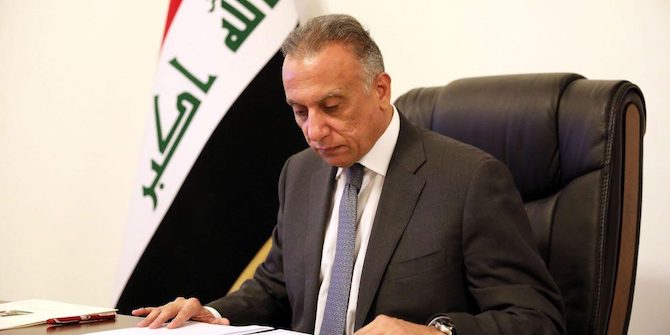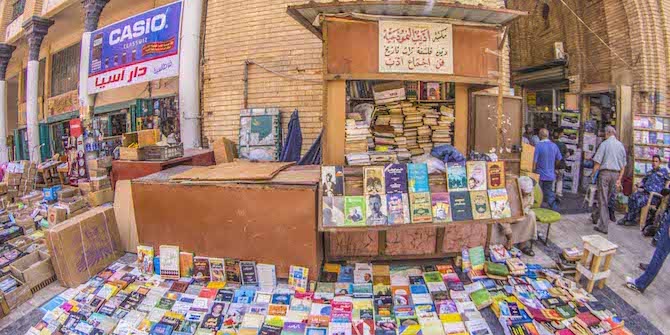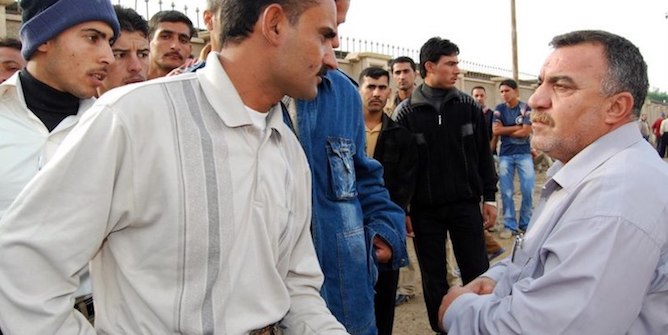by Hayder Al-Khafaji

Following months of high drama and tension which eventually led to the resignation of Prime Minister Adel Abdul-Mahdi, and the subsequent withdrawal of several nominees for the office of prime minister, amongst them Muhammad Tawfiq Allawi and Adnan al-Zurfi; the Iraq’s various political movements and parties finally agreed in April 2020 on a nomination. They chose Mustafa al-Kadhimi, the head of the Iraq’s intelligence service, to take the office of prime minister and in due course to lead the new government. In order to understand the true extent of the difficulties facing al-Kadhimi, it is necessary to outline the challenges and opportunities he is likely to encounter on his path towards stabilising the situation in Iraq.
Opportunities for the New Prime Minister
Al-Kadhimi was selected from among the Shi’a, Sunni and Kurdish parties on the basis of a comprehensive consensus or general agreement, unlike the process by which al-Zurfi was nominated, when the parliamentary majority party had no say in the matter. Therefore, the unprecedented consensus amongst the Shi’a and Sunni political parties and movements, following a prolonged period of division and disagreement, and the large turn-out of the various political groups during the announcement of his candidacy for prime minister bodes well for al-Kadhimi’s chances of implementing his plans for the country’s future. Iraq firstly needs security, with political stability to follow. Given al-Kadhimi’s background in the intelligence service and the positive security relationship he has built up with Iraq’s tribes, hopes are high in this department. As far as political stability is concerned, given the current consensus amongst the various political parties, there are no challenges facing Iraq in the short term.
More than anything else, al-Kadhimi’s candidacy has crystallised the unity of the usually warring Shi’a parties, given the aftermath of last year’s widespread popular protests that many thought had led to irreparable internal divisions and disunity within the Shi’a political scene. Until this point, these parties had consistently put their self-interests and the exploitation of the country’s deteriorating circumstances over and above the national good.
One of the most important aspects regarding the selection of al-Kadhimi, which will undoubtedly help him, is that both Iran and the United States have welcomed his nomination and announced their intention to cooperate with him during his tenure as prime minister. This should lead to a reduction in tensions between the two rival powers on Iraqi soil.
Challenges Facing the New Prime Minister
The country’s turbulent economic situation, accompanied more recently by an unprecedented fall in world oil prices and a corresponding decline in Iraq’s revenues, is both a wake-up call and one of the most important challenges facing al-Kadhimi in the next government, with more than 90 percent of the state’s annual budget depending on oil revenues. It is estimated that Iraq will have a budget deficit of more than $50 billion this year.
The COVID-19 pandemic in Iraq, as elsewhere, has had large-scale negative consequences for the country’s economy, and coupled with the fragile infrastructure of the various sectors of the state, the new government will in all likelihood find itself unable to deal effectively with the effects of these consequences. The manufacturing, tourism, service and agricultural sectors will all face major crises.
The issue of reconstruction and compensation for the heavy losses caused by the war with Da’esh, and the resurgence of some Da’esh cells in Iraq along with the resumption of sporadic attacks, are among the most urgent threats that al-Kadhimi will face towards the beginning of his tenure as prime minister.
The widespread protests over recent months have encouraged the populace to openly express their political and social aspirations, and therefore it is likely to prove difficult for al-Kadhimi to persuade society at large to accept compromise and to reduce longstanding tensions. Accordingly, al-Kadhimi must present to the people a suitable plan with a realistic agenda that includes a reduction in unemployment, fighting corruption and economic reform.
Another pressing question remains over the withdrawal of US forces from Iraq. In light of the vote by the Iraqi parliament on the necessity of the withdrawal of US forces from Iraq in the wake of the assassination of Abu Mahdi al-Muhandis and Major General Qasim Soleimani, there are unresolved tensions amongst the armed groups and political parties on this issue.
The implementation of the policy of restricting weapons to all but the legitimate state security organs, integrating all factions of the Popular Mobilisation Forces (PMF, or Hashd al-Sha’abi in Arabic) within the security apparatus, and placing them under the command of the Commander-in-Chief of the Armed Forces, would be an important step towards ridding the country of partisan loyalties to these factions. Al-Kadhimi is reported to have the backing of Ayatollah Ali al-Sistani for the full integration of the Hashd.
The unprecedented agreement, which followed a prolonged period of division and disagreement between the various actors on the joint nomination of a prime minister, must be evaluated in a constructive manner. The welcoming of al-Kadhimi’s candidacy by the major Shi’a, Sunni, and Kurdish parties, alongside the use of the correct legal procedures for his nomination as a candidate for prime minister, suggest that Iraq has finally taken an important step towards stability, and this step requires the support of all concerned. Furthermore, Iraq’s neighbouring countries have announced their support for him. All these developments, along with the upcoming challenges, have provided Mustafa al-Kadhimi – and Iraq – with a powerful opportunity.







Hi there friends, its fantastic article regarding teachingand completely defined,
keep it up all the time.